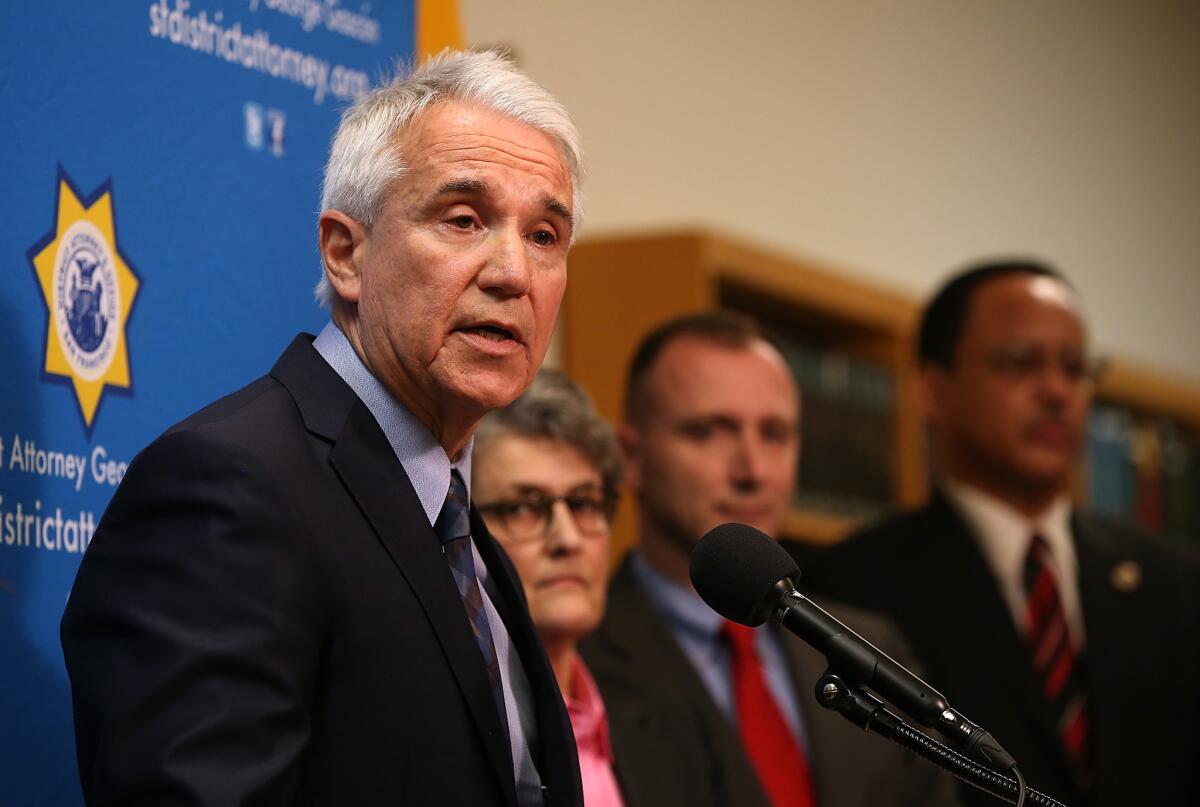Uber sued over unlawful business practices; Lyft settles

Reporting from San Francisco — Los Angeles and San Francisco district attorneys filed a consumer protection lawsuit against Uber on Tuesday, alleging that the popular ride-hailing company misleads consumers about the service’s safety, overcharges them and thumbs its nose at the law.
Meanwhile, prosecutors reached a settlement with Lyft, a competing service, which agreed to “play by the rules,” Los Angeles Dist. Atty. Jackie Lacey said. The companies provide smartphone apps that allow riders and private-car drivers to link up for a taxi-like service that is typically quicker and cheaper than calling a cab.
At a news conference Tuesday, San Francisco Dist. Atty. George Gascon accused Uber of making false and misleading statements about how it protects consumers and engaging in business practices that violate California law.
Uber says it uses an “industry-leading background check process,” Gascon said, but does not fingerprint its drivers. The company’s criminal checks are thus “completely worthless,” he said.
“The company repeats this misleading statement, giving consumers a false sense of security when deciding whether to get into a stranger’s car,” he said.
At a separate news conference in Los Angeles, Lacey said: “It’s not our goal to shut them down. What we’re saying is the advertising is false.”
Uber officials will continue meeting with the district attorneys to address their concerns, company spokeswoman Eva Behrend said.
She added: “Californians and California lawmakers all agree — Uber is an integral, safe and established part of the transportation ecosystem in the Golden State.”
In their civil suit filed in San Francisco Superior Court, the district attorneys seek an injunction forcing Uber to “stop violating” California law, along with civil penalties and restitution for riders who suffered economic harm.
The district attorneys accuse Uber of fraud for charging a $4 “airport fee toll” for rides to and from San Francisco International Airport, even when drivers weren’t paying the toll, and for charging a $1 “safe rides fee” for its background checks.
The suit probably will have no immediate effect on Uber. It’s allowed to keep operating, and Gascon suggested that removing “misleading” language from its website and marketing materials might resolve that element of the complaint.
Financial penalties could be heavy. Gascon said the law allows up to $2,500 per violation, and “there are tens of thousands of violations.… That will be up to the court.” But Uber has plenty of cash, and recent investments in the company put its market value at $40 billion.
The company has been lauded for its creative and aggressive approach to solving commuters’ transportation problems. But critics call Uber an over-aggressive bully, and the company came under fire last month over its data and privacy policies.
As for Lyft, it has agreed to stop picking up passengers at airports until it obtains the necessary permits and approvals, and to submit its app to a state testing agency to measure accuracy in calculating fares, a move Uber refused to make.
Erin Simpson, director of communications at Lyft, said the agreement “demonstrates our shared commitment to consumers and innovation.”
The lawsuit comes as Uber faces a string of legal setbacks. Portland, Ore., and Washoe County in Nevada have issued cease-and-desist orders against the ride-hailing company for failing to meet regulatory requirements.
Although ride-hailing services like Uber and Lyft don’t see much need for regulation, and some regulators say the services are violating current law, the disputes indicate that a powerful market is emerging where no one is quite sure what the rules are. Court cases like the one the district attorneys filed could help define them, and legislators probably will face increasing pressure to provide clarification of their own.
In California, the Public Utilities Commission recently clarified the requirements for companies like Uber to operate in the state, requiring them to hold more extensive insurance policies and conduct more thorough vehicle safety inspections and background checks on drivers.
Thilo Koslowski, vice president and automotive practice leader at the technology analysis firm Gartner, said he’s not surprised by the regulatory obstacles facing Uber.
“The company is still young and, because of the speed in which it’s expanding, it’s just encountering these things that are part of growing up,” Koslowski said.
In addition to better background checks, Koslowski said the company may want to consider technological solutions like security cameras or an SOS button in each car for passengers.
“Uber has to address these problems because if it doesn’t, it’s at risk of letting these things get out of control,” he said.
Overseas, Uber is also experiencing pushback. In New Delhi, the state government recently banned the service after an Uber driver reportedly raped a passenger. Police said that the company did not conduct an adequate background check on the driver, and that his car did not have a GPS tracking system installed, as required by law.
On Tuesday, Rio de Janeiro’s municipal transport department filed a complaint against Uber and similar ride-hailing companies, saying they lacked the licenses to operate a taxi service. Drivers who continue to operate in the region risk having their cars seized, the department said.
A judge in Spain also ordered Uber to stop operating until it obtained appropriate authorization.
Twitter: @traceylien; @russ1mitchell
Times staff writer Marisa Gerber contributed to this report.








